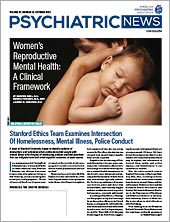In 2018, the California legislature passed the “Right to Know Act,” allowing access to reports of police internal investigations and officer disciplinary actions in the state.
The law made three categories of records available for public access: reports of use of force resulting in serious injury or death; reports of sexual assault by a California officer on the job; and instances of official dishonesty when it has been determined that an officer was dishonest on the job, affecting the reporting, investigation, or prosecution of a crime or the investigation of another officer’s misconduct.
But as Lisa Pickoff-White, data journalist and senior producer for KQED (the public television and radio station in the San Francisco Bay Area), told Psychiatric News, the law made the records accessible only; it didn’t make them public. “Someone has to ask for them,” she said.
Enter the California Reporting Project (CRP), formed in 2019 when KQED joined five other media outlets in the state—the Los Angeles Times, the investigative reporting program at the University of California, Berkeley; CapRadio in Sacramento; and KPCC-Last—to begin requesting reports from the more than 700 police departments throughout the state. Today, more than 40 news outlets in the state are participating in CRP.
“We have received more than 100,000 reports, and some of these reports are extraordinarily long,” Pickoff-White said. They contain voluminous notes, text messages, and other recordings from incidents involving death or serious injury. “And that’s just the tip of the iceberg. We are able to request reports not just from police agencies but district attorneys, oversight bodies, and anyone who collects such records.”
It is an enormous endeavor, and CRP has sought to partner with researchers who can help comb through the records for relevant information. CRP is also working with data technicians and engineers at Berkeley and Stanford to automate the extraction of information, creating open-source tools the public can use to access reports. Pickoff-White is also working with Community Law Enforcement Accountability Network (CLEAN) to do similar work nationwide.
The psychiatric ethics research team at Stanford University, led by Laura Roberts, M.D., M.A., is collaborating with CRP to look specifically at reports of injury or death by police involving people deemed to be mentally ill and/or intoxicated. She is chair and the Katharine Dexter McCormick and Stanley McCormick Memorial Professor in the Department of Psychiatry and Behavioral Sciences at the Stanford University School of Medicine. She is also editor in chief of books at APA Publishing.
In a preliminary report aired this past March, CRP reported that in Bakersfield—a city of approximately 400,000 people north of Los Angeles in the southern part of the San Joaquin Valley—11 of 18 people who died during encounters with the police between 2014 and 2020 were believed to be mentally ill and/or intoxicated.
Pickoff-White said that the true status of an individual who is killed or injured is sometimes unclear. “One of the things we have found is that different officers at the exact same incident may perceive differently whether someone is mentally ill or intoxicated,” she told Psychiatric News. “I have looked at a case where I have seen police reports from three officers who were there, and each person came to a separate conclusion about what they thought that person’s mental status was at the time.”
The collaboration with Roberts and her team at Stanford is crucial, Pickoff-White said. “It’s been very exciting to see a group of people from so many disciplines work together. It has to be an interdisciplinary project because examining these cases really requires understanding a legal framework, a psychiatric framework, and a law enforcement framework.” ■

